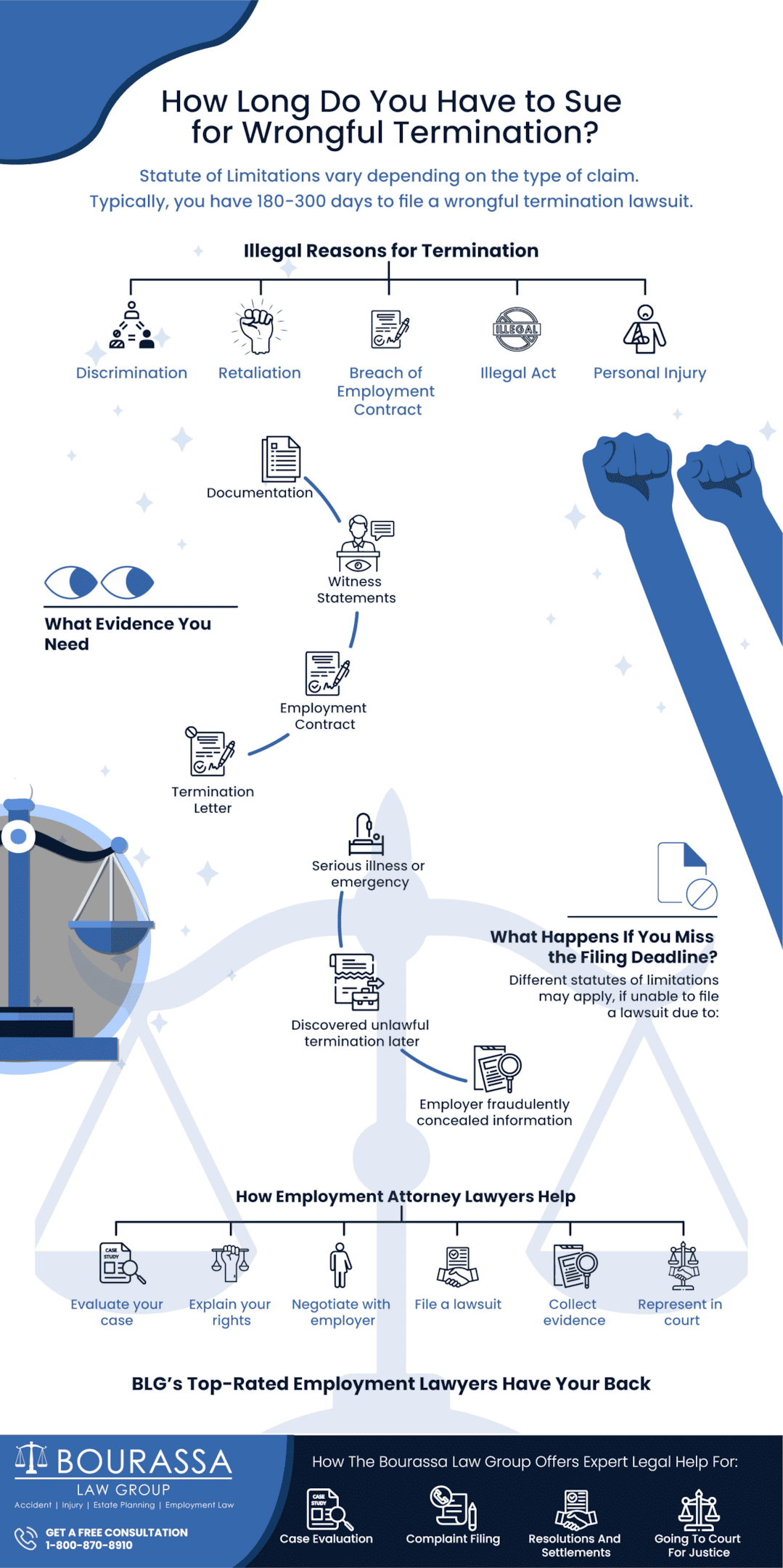
If you’ve recently experienced termination of your employment or are worried about your job security, you’re not alone. Employment law issues are more common than you might think. Employers sometimes terminate employees for illegal reasons, leading to wrongful termination claims. In this article, we will discuss how long you have to sue for wrongful termination, the relevant legal concepts, and what to consider when pursuing legal action. It’s essential to understand your rights and the time limits associated with a wrongful termination claim.
Understanding Wrongful Termination
Wrongful termination occurs when an employer dismisses an employee in violation of state or federal laws. It can take various forms, such as discrimination, retaliation, or breach of an employment contract. Generally speaking, if you believe you were fired for illegal reasons, you may have a case.
Wrongful Termination Statute of Limitations
Before diving into the details of wrongful termination lawsuits, it’s crucial to grasp the concept of the statute of limitations. This legal term refers to the time frame within which you can file a lawsuit. In the context of employment law, the statute of limitations varies depending on the type of wrongful termination claim.
Discrimination Claims: Time Limits
Discrimination-based wrongful termination claims typically revolve around race, age, gender, national origin, disability, or other protected classes. In such cases, you have a limited time to file a lawsuit. The time limits can vary, but generally, you should act promptly.
Title VII of the Civil Rights Act of 1964, for example, allows 180 days from the date of the alleged discrimination to file a claim with the Equal Employment Opportunity Commission (EEOC). However, this limit can be extended to 300 days in states with their own anti-discrimination laws. After receiving an EEOC “right-to-sue” letter, you usually have 90 days to pursue a lawsuit.
Age discrimination claims under the Age Discrimination in Employment Act (ADEA) have a 180-day limit to file with the EEOC, which can be extended to 300 days in states with their own anti-discrimination laws.
It is critical that you contact a knowledgeable attorney in your state to make sure that all applicable deadlines and statutes of limitations are preserved with respect to your individual claims.
Contract Claims: Varying Time Limits
If you have an employment contract and your employer breaches it, you may have a wrongful termination claim. Contract claims don’t follow the same timeline as discrimination claims; instead, they depend on the terms of the contract. You should act as soon as you’re aware of the breach. If your contract specifies a notice period, ensure you adhere to that. If you’re unsure about your rights, consulting an experienced employment law attorney is advisable.
At-Will Employment: Understanding the At-Will Employee
The majority of employment relationships in the United States are considered “at-will employment.” This means that employees can leave their employment at any time, and employers can terminate employees at any time for any reason, as long as it’s not an illegal reason. At-will employees have fewer protections than those with employment contracts. However, if you believe you were fired for an illegal reason, you can still pursue a wrongful termination claim.
Illegal Reasons for Termination
If you were terminated for illegal reasons, you have the right to seek legal redress. Wrongful termination claims can arise from a variety of illegal acts, including:
Discrimination:
If you believe you were fired because of your age, gender, race, religion, disability, national origin, or other protected class, you may have a case. Employers cannot terminate employees based on these factors.
Retaliation:
Employers cannot fire employees for engaging in protected activities such as filing a workers’ compensation claim, reporting illegal conduct like sexual harassment, or participating in an investigation.
Breach of Employment Contract:
If you have an employment contract, your employer must adhere to the terms of the agreement. If they violate the contract, you may have a wrongful termination claim.
Illegal Act:
If your employer asks you to perform an illegal act, and you refuse, they generally cannot legally terminate you for refusing to do something unlawful.
Personal Injury:
If your termination results from a disabling condition or illness, you may be protected by the Americans with Disabilities Act (ADA). Employers must provide reasonable accommodations for employees with disabilities.
Confidential Information:
If you were fired for reporting unethical or illegal conduct within your organization, your termination may be unlawful.
Strong Evidence
To prove wrongful termination and succeed, strong evidence is imperative. This may include:
Documentation: Keep records of any incidents related to your termination, including emails, performance reviews, and any communication with your employer or co-workers that may support your case.
Witness Statements: Statements from co-workers or colleagues who can attest to your job performance, the reasons for your termination, or any illegal reasons for your dismissal can be crucial.
Your Employment Contract: If you have an employment contract that outlines the terms and conditions of your employment, it can serve as a valuable piece of evidence in your case.
Termination Letter and Process: Review your termination letter and the process that led to your firing. Any inconsistencies or irregularities can be important evidence.
What Happens If You Miss the Filing Deadline?
If you miss the statute of limitations for your wrongful termination case, you may lose the opportunity to sue for wrongful termination. It’s vital to be aware of these time limits and act promptly. However, there are a few exceptions that may extend the time frame in certain circumstances. These exceptions, while not guaranteed, are recognized by the legal system to accommodate situations where it might be unfair to strictly enforce the statute of limitations.
Equitable Tolling:
Equitable tolling may be applied when a plaintiff is prevented from filing a lawsuit due to circumstances beyond their control. For example, if you were unable to file your lawsuit because of serious illness, incapacitation, or a sudden family emergency, the court may consider tolling the statute of limitations. Equitable tolling is typically rare and is granted on a case-by-case basis.
Discovery Rule:
In some cases, wrongful termination claims may not be immediately apparent. For instance, you might discover evidence of discrimination or illegal termination well after the actual event. In such cases, the discovery rule may apply, allowing the statute of limitations to start running from the date you discovered, or should have reasonably discovered the wrongful act.
Fraud or Concealment:
If your former employer fraudulently conceals information related to your wrongful termination, it may extend the time frame for filing a lawsuit. The statute of limitations typically starts running once the plaintiff could reasonably have discovered the fraud or concealment.
It’s important to note that these exceptions are not always easy to invoke, and they vary from state to state. Therefore, if you believe you have a valid claim but have missed the initial filing deadline, consult with an experienced employment law attorney immediately. They can evaluate your specific circumstances and advise you on whether any of these exceptions might apply in your case.
Exceptions and Special Cases
It’s important to note that there are exceptions and special cases that can affect the time limits for suing for wrongful termination. For example, certain claims may have a different statute of limitations if they involve federal employees or involve actions by a government agency. Additionally, if your case involves complex issues, such as illegal termination based on disability or sexual harassment, the time limits may vary.
Moreover, specific laws like the Genetic Information Nondiscrimination Act (GINA), Age Discrimination in Employment Act (ADEA), and the Americans with Disabilities Act (ADA) may have their own unique time limits.
The Role of an Experienced Employment Law Attorney
An experienced employment law attorney is not just a legal professional; they are your advocate, your guide, and your ally in the pursuit of justice when facing wrongful termination. When you find yourself in the challenging position of dealing with a potentially illegal termination, your attorney plays a pivotal role in your quest for redress. Here’s how:
Evaluating the Case:
Your employment law attorney is the first line of defense in your battle for justice. They’ll meticulously review the details of your situation, combing through your employment history, the circumstances surrounding your termination, and any available evidence. This initial evaluation is crucial as it helps determine whether you have a viable unlawful termination claim. Attorneys with extensive experience in employment law can quickly identify the legal merits of your case.
Understanding Your Legal Rights:
Laws surrounding employment and wrongful termination suits are intricate and can vary greatly from state to state. An experienced attorney will serve as your educator, ensuring that you understand your legal rights. They will explain the specific laws and regulations that may apply to your case. This knowledge empowers you to make informed decisions about how to proceed and the potential outcomes of your case.
Negotiating with Your Former Employer:
In some instances, litigation is not the first step. Your attorney may attempt to resolve the issue through negotiations with your former employer. This can be a more expedient and cost-effective way to reach a settlement, and it may allow you to avoid the protracted legal process. Experienced attorneys are skilled negotiators who can work diligently to secure the best possible outcome on your behalf. While they aim for an amicable resolution, they are also prepared to escalate the case if negotiations do not lead to a satisfactory outcome.
Filing a Wrongful Termination Lawsuit:
When negotiations fail, your attorney will guide you through the process of filing a wrongful termination lawsuit. This includes preparing all necessary documents, adhering to strict legal deadlines, and ensuring your case is filed correctly. Their expertise ensures that your claim is properly structured, setting the stage for a robust legal battle.
Collecting Evidence:
Building a strong case often hinges on the quality and quantity of evidence. Your attorney will play a critical role in helping you gather and organize the necessary evidence. This might involve collecting emails, performance reviews, witness statements, and any other relevant documentation that strengthens your case. Your attorney’s guidance ensures that the evidence is legally admissible and presented effectively.
Representing You in Court:
Should your case proceed to court, your employment law attorney becomes your staunch advocate and legal representative. They will argue your case before a judge and jury, presenting a compelling narrative supported by the evidence. Their role in court is multifaceted, including cross-examining witnesses, addressing legal challenges, and advocating for your rights. An experienced attorney’s presence in the courtroom is invaluable, as they understand the intricacies of employment law and know how to effectively communicate your grievances to the court.
Steps to Take if You’re a Victim of Wrongful Termination
If you believe you’re a victim of wrongful termination, follow these steps:
Consult an Employment Lawyer: Seek legal counsel from an experienced employment law attorney as soon as you believe you’ve been wrongfully terminated. The sooner you initiate this process, the better.
Document Everything: Keep records of all relevant documents, emails, performance reviews, and any communication with your employer regarding your termination. This evidence is crucial in building a strong case.
File a Complaint: If applicable, file a complaint with the appropriate government agency, such as the Equal Employment Opportunity Commission (EEOC), as this may be a prerequisite for pursuing a lawsuit.
Follow Legal Procedures: Comply with all legal procedures, including the statute of limitations, and ensure you meet the necessary deadlines.
Seek Mediation or Settlement: Before pursuing a lawsuit, explore the possibility of mediation or a settlement with your former employer. This may help you avoid a lengthy and costly legal battle.
Consult Your Attorney on Exceptional Circumstances: If you’ve missed the statute of limitations, consult with your attorney to determine if any exceptional circumstances apply in your case.
Understand Your Legal Rights: Be aware of your legal rights and the laws governing wrongful termination in your state. Your attorney will guide you through these rights and laws, ensuring you make informed decisions.
Act Promptly: Time is of the essence in wrongful termination cases. The sooner you take action, the stronger your case is likely to be.

Contact Bourassa Law Group for Experienced Employment Attorneys
In summary, the time limits for suing for wrongful termination can vary widely depending on the specific circumstances of your case, your location, and the laws that apply. To ensure you protect your legal rights, gather strong evidence, and navigate the complexities of employment law, it’s crucial to consult with an experienced employment law attorney.
If you believe you’ve been wrongfully terminated and are considering legal action, don’t delay. Contact Bourassa Law Group, a reputable law firm specializing in employment law issues to discuss your case. We can provide you with the guidance and legal services you need to pursue a wrongful termination lawsuit and seek justice for the illegal act committed by your former employer.
Your legal rights deserve protection, and our experienced attorneys can help you make a well-informed decision regarding your next steps. Remember, the time limits for suing for wrongful termination are crucial, so seek legal counsel as soon as possible to secure the best outcome for your case.
Book an appointment for a free consultation today!






